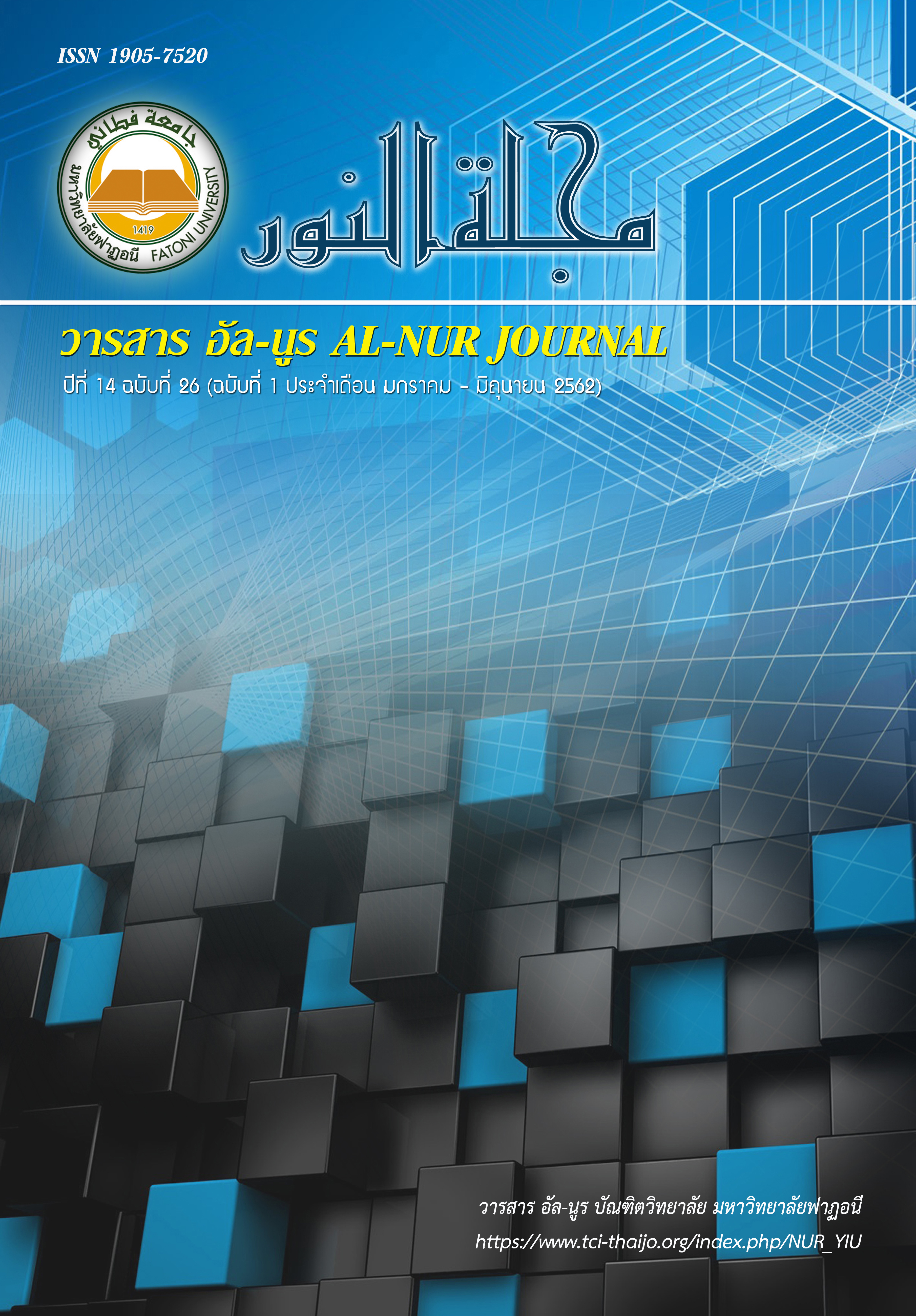Information System Development for Field Experience Practice Management of Sciences Students at Yala Rajabhat University.
Abstract
This study aims to; 1) develop the information system for field experience practice of science students at Yala Rajabhat University and 2) study the use of the developed information system. The research methodology was divided into 3 steps; step 1 was to study the performance, problem and the need in management of sciences students in field experience practice, step 2 was to develop the information system for field experience practice and step 3 was to study the use of the developed information system. The samples used were 194 people who are 134 students from the faculty of Science Technology and Agriculture, who registered this course “field experience practice” in the second semester of academic year 2016, that were selected using stratified random sampling, 30 supervisors and 30 mentors for evaluators from the workplace. The research tool was the open ended questionnaire, the Black Box Testing form for evaluating the efficiency of information system and satisfaction questionnaire. The data were analyzed using percentage, mean, standard deviation and descriptive report was employed.
The findings indicated that; 1) the problems of field experience practice management were the selection of the workplace for the field experience practice, the problems of how to coordinate with the relevant persons, the problems of problems of supervisor and the need of information system as the tool for field experience practice management.; 2) the information system was on the university website at URL: https://eduservice.yru.ac.th/experience/ and its efficiency was at a high level with mean at 4.26 that means the developed information system can be used efficiently and 3) it was found that the supervisors, the mentors at the workplace and the students were satisfied in using the developed information system at a high level with mean at 4.24, 4.16 and 4.13 respectively.
References
แก้ไขเพิ่มเติม (ฉบับที่ 3) พ.ศ.2553. กรุงเทพมหานคร: สำนักนายกรัฐมนตรี.
เด่นชัย สมปอง, ดร.สายชล จินโจ, ดร.สุขแสง คูกนก, ดร.เผด็จ พรหมสาขา ณ สกลนคร. (2556).
การพัฒนาระบบบริหารจัดการฝึกประสบการณ์วิชาชีพ โดยอาศัยเทคโนโลยี สารสนเทศและ
การสื่อสาร. วารสารมหาวิทยาลัยราชภัฏสกลนคร. ปีที่ 6 ฉบับที่ 11 (มกราคม-มิถุนายน)
หน้า 65-79.
เดือนฉาย ไชยบุตร และ ณัฐิยา ตันตรานนท์. 2561. เทคโนโลยีสารสนเทศเพื่อการเรียนรู้ทาง
อิเล็กทรอนิกส์ร่วมกัน: การวัดและประเมินผลการเรียนรู้ตามกรอบมาตรฐานคุณวุฒิ
ระดับอุดมศึกษาแห่งชาติ. วารสารมหาวิทยาลัยราชภัฏยะลา. ปีที่ 13 ฉบับที่ 1 (มกราคม-
เมษายน) หน้า 13-26.
บุญชม ศรีสะอาด. 2553. การวิจัยเบื้องต้น. พิมพ์ครั้งที่ 8. กรุงเทพฯ: สุวีริยสาสน์.
บุปผชาติ ทัฬหิกรณ์. 2554. ทฤษฎีและหลักการสำหรับการเรียนรู้ในศตวรรษที่ 21. จากอินเทอร์เน็ต.
http://www.ku.ac.th/ icted2551/Download/theory21st.pdf (ค้นเมื่อ 31 มกราคม
2554).
ไพฑูรย์ สินลารัตน์. 2557. ครูในศตวรรษที่ 21. งานประชุมวิชาการ “อภิวัฒน์การเรียนรู้สู่จุดเปลี่ยน
ประเทศไทย: สสค. กรุงเทพมหานคร: อิมแพค เมืองทองธานี, 6 พฤษภาคม 2557.
ราชภัฏยะลา, มหาวิทยาลัย. 2558. คู่มือการฝึกประสบการณ์วิชาชีพ. ยะลา : มหาวิทยาลัยราชภัฏยะลา.
วิชานี สากลบรรเจิด. 2553. การศึกษาทัศนคติของบุคคลากรด้าน Information Technology
ในการนำ SDLC รูปแบบ Waterfall มาใช้ในโครงการพัฒนาระบบสารสนเทศ:
กรณีศึกษา บริษัทโทรคมนาคมแห่งหนึ่งในประเทศไทย. วิทยาลัยนวัตกรรม: มหาวิทยาลัย
ธรรมศาสตร์.
สุภา ยธิกุล. 2553. ปัญหาการฝึกประสบการณ์วิชาชีพของนักศึกษาคณะวิทยาศาสตร์เทคโนโลยีและ
การเกษตร. ยะลา: มหาวิทยาลัยราชภัฏยะลา.
โอภาส เอี่ยมสิริวงศ์. 2554. ระบบสารสนเทศเพื่อการจัดการ (Management Information System:
MIS). กรุงเทพมหานคร: ซีเอ็ดยูเคชั่น.
Capron, H. L. and Johnson, J. A. 2004. Computer : Tools for an Information Age. 8thed.
New Jersey : Pearson Education International.
Jessup and Valacich. 2008. Information Systems Today, 3rded., Pearson Prentice-Hall".
Laudon, K.C. and Laudon, J.P. 2011. Essentials of management information systems :
Organization and technology in the enterprise. 4thed. Upper Saddle River,
NJ:Prentice Hall.
M. Faisal Fariduddin Attar Nasution and H. Roland Weistroffer. 2009. Documentation in
Systems Development: A Significant Criterion for Project Success, 2009 IEEE.
Nidhra, S. and Dondeti, J. 2012. “Black Box and White Box Testing Techniques-A
Literature Review”. International Journal of Embedded Systems and
Application(IJESA). 2(2), p. 201-218.
Yamane. 1967. Taro Statistic : An Introductory Analysis. New York: Harper



